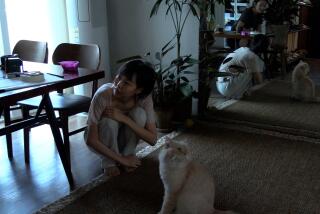Individuals’ Prowess Drives Seoul Troupe’s Lament on Life
Choreography reflecting a refined and often mournful sensibility plus performances of faultless skill made a four-part program by Seoul Contemporary Dance Company doubly impressive Thursday in the Gallery Theatre at Barnsdall Park.
A year ago, the Korean company brought dances emphasizing group achievement. This return engagement, however, mostly showcased individual artistry--starting with the intensity and gymnastic prowess of Won-Kap Park and Mi-Kyung Song in “Total Eclipse,” a panorama of joyless, abusive relationships by artistic director Myung-Sook Park.
Using a large sculptural crescent by Chae-Sun Shim as an upstage focal point and as a symbol of the gulf separating her troubled lovers, Park explored hetero couplings, same-sex partnerships and even a tangled threesome with disarming boldness and an unyielding insistence that the search for love is hopelessly doomed.
In “Invocation for the Dead Spirit,” she also created a compelling union of opposites within a funeral ceremony--traditional versus contemporary movement forms, solo versus group activity, ritual formality versus raw emotion. Fusing all these elements: a dynamic, mercurial, altogether brilliant performance by the willowy Sung-Hee Cho.
Indeed, Cho danced with enough power to make the piece a requiem for an entire epoch, just as her own “Loop of Time” solo on the program showed her invoking the most profound questions about human identity simply by contemplating and then wearing a stark white mask. That mask transformed and energized her, sending her careening down a circuitous path traced in sawdust that she sadly revisited once the mask had been discarded. Even the clumsy use of slide projections didn’t lessen the impact of the piece.
After Cho’s superb sensitivity, the blunt satire of Hae-Joon Park’s “The Habit” looked feeble indeed, despite energetic execution by the choreographer and Sun-Young Kim. The piece began in promising stylized depictions of shyness and attempts at contact. Alas, it soon descended into jokey, overextended eclecticism, with the self-consciously cute show-biz parody near the end especially juvenile.
More to Read
The biggest entertainment stories
Get our big stories about Hollywood, film, television, music, arts, culture and more right in your inbox as soon as they publish.
You may occasionally receive promotional content from the Los Angeles Times.










